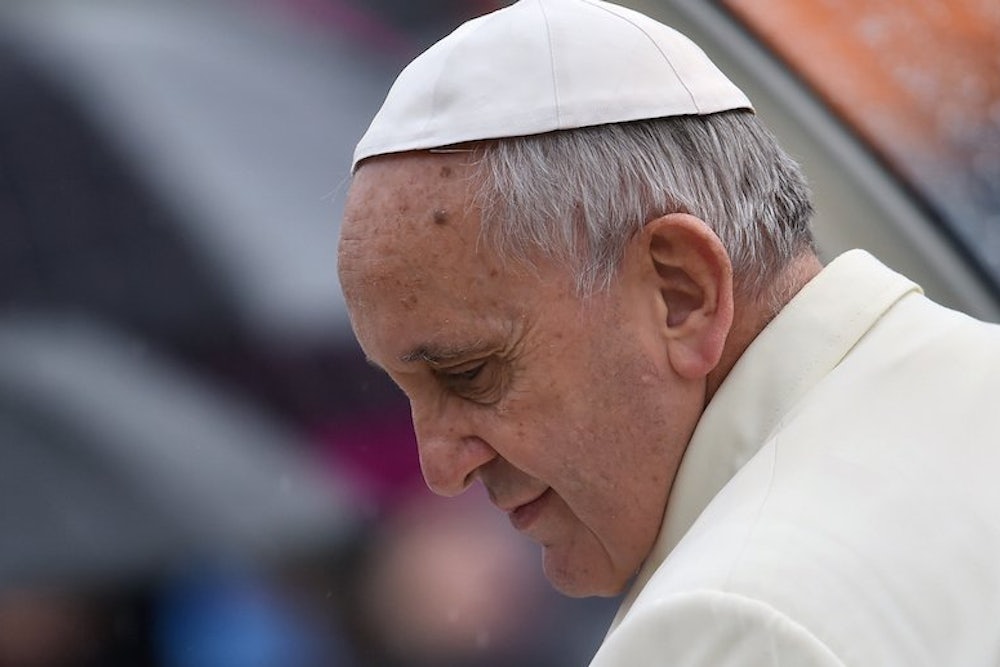One of the most appealing aspects of Pope Francis is his personable, easygoing manner: he kisses babies, loves jokes, and has a generous smile. But his writings do not always resemble his demeanor. In fact, darkness animates much of his thought.
Speaking to Congress last week, the Pope warned that today’s young people “seem disoriented and aimless, trapped in a hopeless maze of violence, abuse and despair.” To the United Nations the following day, Francis declared that “the future demands of us critical and global decisions in the face of worldwide conflicts which increase the number of the excluded and those in need.” In both messages, he meditated on the necessity of caring for our climate, lest we face disaster, and on the danger of ascendant violence and the darkness of a world marked by domination and waste.
Given that one of Francis’s main concerns is climate change, a problem of extreme import which many seem content to do nothing about, it makes sense that he would deploy apocalyptic rhetoric to capture the attention of his listeners. But he was rather pessimistic since before his U.S. trip, and before his encyclical last summer, Laudato Si', warned of ecological disaster. In fact, Francis has been pessimistic since he became pontiff in March 2013.
That pessimism has become an increasing point of contention for his critics. Writing in the Catholic Herald in June, fellow Catholic Phillip Booth accused Francis of being “unduly pessimistic,” given that the overall trend worldwide is toward better health and longer lives than were common in earlier eras. Matthew Schmitz, deputy editor of First Things magazine, similarly defined Laudato as “the work of a profoundly pessimistic man” in a Washington Post op-ed shortly after the encyclical’s release. The Wall Street Journal also imagined the document to be “steeped in pessimism”; the Mises Institute, a libertarian think tank, decried Francis’s “vision that is relentlessly pessimistic.” If you have a problem with what Francis has to say, expressing your unhappiness through criticisms of his gloomy tone is a popular option.
But what’s the problem with a pessimistic pope?
Francis certainly isn’t the first Catholic to take a somewhat dim view of humanity and its prospects. In his encyclical Caritas in Veritate, published in 2009 during the height of a global financial crisis, Pope Benedict XVI wrote that the crisis “presents us with choices that cannot be postponed concerning nothing less than the destiny of man, who, moreover, cannot prescind from his nature.” The matter of how to respond to the booms and busts of financial markets was complicated for Benedict by the fact of human nature: Without genuine effort and exhortations to goodness, the tendency of people to ignore future outcomes in favor of instant pleasure seemed to him insurmountable. It’s hard not to see his point, and it wasn't an observation born out of the relentless undulation of modern markets. In the Book of Jerimiah, God observes that humanity persists in evil despite the obvious preferability of good, concluding, "The heart is deceitful above all things and beyond cure." The notion that the human will cants toward wickedness isn't an innovation of Francis's, in other words; it's a consistent characteristic of Christian anthropology.
But there’s more than precedent in favor of Francis’s less-than-rosy approach to humanity and its struggles.
For one, Francis is a globally conscious Pope, and what strikes us in the West as excessive gloominess might seem despairingly familiar to millions of people living in developing countries beset by violence, illness, and disasters. For Francis to speak to the needs of these vulnerable people, he has to internalize the reality of their conditions, regardless of how dark his rhetoric then seems to people living in decidedly sunnier circumstances.
More than recognizing the realities of the suffering, though, Pope Francis’s bleak take on the future is less a diagnosis of the future as a time and space, and more a prognosis of unchecked human activity today. There is a tendency in our age to imagine that the future will always be better and brighter than the past, by way of technological advancement and greater human mastery of nature—the Whig view of history, in other words. But Christian anthropology does not entitle faithful persons like Francis to be half so sanguine. Saint Augustine once wrote that “we make our times; such as we are, such are the times,” not so much an observation as an accusation. If our times are dark and our future imperiled, it is likely much thanks to human behavior. When Francis diagnoses the future darkly, it is because he recognizes that generations to come will be left not with the outcome of non-human processes, but with the remnants of deliberate human malfeasance.
In other words, if Francis were less pessimistic, he would be taking an unprecedentedly bright view of human nature, regardless of global trends in health and technology. While some aspects of life may improve (for some populations) with time, each person is also humanity born anew. Francis is keen to recognize that exhortations to critical action are necessary, and that they are useless unless they rely on the truth. And the truth is pretty gloomy.
